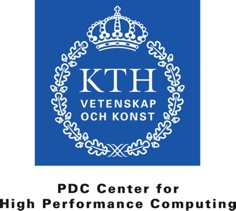Introduction to High-Performance Computing
PDC Summer School
Stockholm, Sweden
August 18-29, 2014
http://www.pdc.kth.se/education/summer-school
Invitation
Are you interested in using one of Europe’s faster supercomputers (and getting university credit points for doing so)? Would you like to learn how to write programs for parallel supercomputers, such as a Cray or a cluster of Graphics Processing Units? Do you need to optimize already-existing scientific program code for high- performance computing?
If you answered “yes” to any of these questions, or if you want to learn the basics about high-performance parallel computing, the PDC Center for High- Performance Computing, in conjunction with the School of Computer Science and Communication (CSC ) at the KTH Royal Institute of Technology in Stockholm, Sweden, invites you to our summer school: "Introduction to High-Performance Computing". The course will be held in Stockholm at the KTH main campus August 18-29. The course is given in English and is open to researchers and master and PhD students, from anywhere in the world.
To find out more about our exciting summer school, visit our web page at http://www.pdc.kth.se/education/summer- school/.
Background
The PDC Summer School in High-Performance Computing has been held at the KTH Royal Institute of Technology in Stockholm each summer since 1996 to help researchers to improve their scientific computing skills. This year will be the nineteenth year that the course has run.
During two intensive summer weeks at the KTH campus, summer school participants are introduced to programming supercomputers, and also learn how to improve programs for parallel scientific applications so that they run more efficiently.
Participants who successfully complete the course (including the associated programming project) will be awarded 7.5 ECTS (European Credit Transfer and Accumulation System). Note that 1.5 ECTS credits are equivalent to a workload of one 40-hour week, so the whole course is equivalent to five full-time weeks of study including project work.
Participants are encouraged to bring their own problems or programs for discussion – where possible, these may be used as the basis of the course project. During the summer school, participants will be given access to PDC's Cray XE6 system, Lindgren, which is one of the fastest supercomputers in the Nordic countries.
There are a limited number of spaces available on the course, so please register early!
Registration for the 2014 summer school will open on March 15 and will close on June 1.
Outline
The summer school classes will consist of about 35 hours of lectures and 35 hours of computer lab sessions covering topics such as:
- parallel programming (MPI, OpenMP, GPU),
- modern computer architectures,
- parallel algorithms,
- efficient programming, and
- HPC case studies.
The lectures given by international experts followed by hands-on sessions in the PDC computer lab – these will give participants the opportunity to obtain practical experience of the HPC topics covered in lectures.
The PDC Summer School receives considerable funding from SeSE, the Swedish e-Science education. The two leading e-Science Centres in Sweden, SeRC (www.e-science.se) and eSSENCE (essenceofescience.se) have taken the initiative to establish a Graduate School SeSE, to fund, develop and offer basic training in fields where the use of e-Science is emerging and where education can have an immense impact on the research, but also advanced training for students in fields that are already computer-intensive. The school is open to all graduate students in Sweden, and is built upon the previous successful school NGSSC and KCSE. SeSE will be a meeting place for graduate students using e-Science tools and techniques.

